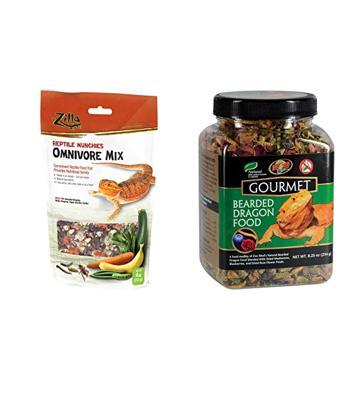Bearded dragons love eating thyme. They also love eating grasshoppers, crickets, worms, and even small rodents.
Some people say that bearded dragons shouldn’t be fed thyme because it contains thymol, which is toxic to reptiles. However, others claim that bearded dragons do just fine on thyme.
In this article, I’m going to tell you everything you need to know about whether bearded dragons should eat thyme or not.
Can Bearded Dragons Eat Thyme?
Thyme is a member of the mint family and is native to Europe and Asia. Its small leaves are used as a flavoring agent in cooking and herbal medicine.
Bearded dragons enjoy eating thyme for its rich flavor and aromatic scent. But, it should only be added to a balanced healthy diet.
Young bearded dragons should only consume 30% green foods and for adults, it’s 70%.
So, it is important to understand how to properly include thyme in their diet. In this article on Can Bearded Dragons Eat Thymesome tips on how to include thyme in their diets.
What Kind Of Thyme Can Bearded Dragons Eat?
Thyme is a herb that can be used to flavor food. You can find it growing in gardens, fields, and forests. There are several types of thyme, including common garden thyme, lemon thyme, and oregano thyme. All of these are edible for bearded dragons.
But beware of using any kind of thyme that has yellow flower buds or leaves. These are toxic to bearded dragons. Instead, try using green leafy stems and purple flowers.
There are two main kinds of thyme that bearded dragons can eat. One is called common garden thyme. It has green leafy stems and tiny purple flowers. Another is called lemon thyme. It has smaller white flowers and larger leaves. Both of these are safe for bearded dragons.
Is Thyme Safe for your Bearded Dragon?
Thyme is considered safe for bearded dragons. It’s rich in Vitamin C, which helps boost your bearded dragon’s immune system. It also contains a lot of minerals, including copper, iron, and magnesium. These minerals are essential for your bearded dragon’s overall health.
Bearded dragons require vitamins for proper growth and development. Thyme is full of Vitamin A, which is important for your bearded dragon’s vision. Thyme also contains fiber, which isn’t very helpful for your bearded dragon. But it does provide some nutrition.
All of these factors make thyme a great herb for your bearded dragon. You should only give thyme occasionally, though. Avoid giving thyme every day if possible.
What Benefits Can Bearded Dragons Get from Thyme?
There are several benefits bearded dragons can get from thyme.
Add Variety to Your Pet’s Meals
Thyme is great for adding variety to your bearded dragon’s meals. It gives them a unique flavor that makes them more interested in eating. And since thyme is known to be beneficial for pets, it’s important to give your lizard a healthy dose of this herb every day.
However, like humans, reptiles have personal tastes and may dislike the taste or smell of thyme. You should never force your lizard to eat anything they don’t want to eat. Instead, try introducing thyme gradually and let your lizard decide whether they want to eat it or not.
Offer Essential Nutrients
Bearded dragons are prone to various illnesses, including metabolic bone disease (MBD), so it’s important to provide them with essential nutrients. One of the easiest ways to do that is by offering thyme as complementary food.
Thyme is rich in vitamin C, which helps support your pet’s immune system. It also has B-complex vitamins and minerals like iron and manganese, which are necessary for proper metabolism and growth.
However, as mentioned above, thyme may not be enough to meet your pet’s nutritional needs. So, it’s best to only feed it alongside your pets’ main meals.
What are the Risks of Feeding Thymes to Bearded Dragons?
Thyme is a common ingredient in cooking and herbal remedies. But there are risks associated with feeding it to bearded dragons. Here are two major risks:
Nutrient Deficiency
Nutrient deficiency – Thyme contains fewer nutrients than other vegetables in your pet’s diet. Too much of this minty spice will keep your pet from getting enough nutrition.
Toxicity
Toxicity – Some plants have toxins that can cause serious health issues. Thyme is one of those plants. It contains acids that can irritate your pet’s digestive system and cause diarrhea and severe dehydration.
Poisoning and Infection
Another problem is that it can lead to infection. Wild plants may carry disease-causative bacteria, and eating those plants could result in illness or death.
it can also cause poisoning. Some plants may have dangerous chemicals like pesticides and fertilizers. These substances can be fatal to reptiles.
How to Feed Thyme to Bearded Dragon
Thyme is a herb that is commonly used in cooking. You can add it to salads, soups, sauces, and other dishes. It adds a nice scent and flavor to foods. However, there are certain precautions you must take before adding it to your bearded dragon’s diet.
First, make sure to buy fresh thyme from the grocery store. Fresh thyme has fewer chemicals than dried thyme. Also, wash it well with water before using it.
Next, chop it into small pieces and serve it with other food. Don’t give it to your bearded dragon straight out of the package. Give it to your bearded dragon with other food.
Finally, keep a small bowl of water next to the food bowl. This will prevent your bearded dragon from getting sick after eating thyme.
Nutritious Value of Fresh Thyme
Thyme is a herb that’s great for reptiles. You can feed your bearded dragon fresh thyme without fearing for its safety. And he or she will definitely enjoy eating it.
But what does thyme actually do for your bearded dragon? Well, per tablespoon serving of fresh thymine contains calories, protein, fat, carbohydrates, fiber, and vitamins.
Calories: Thyme is low in calories. Each tablespoon of fresh thyme only contains 0.8 calories.
Protein: Thyme is high in protein. Each tablespoon of fresh thyme contains 0 grams of protein.
Fat: Thyme is low fat. Each tablespoon of fresh thee contains 0 grams of fat.
Carbohydrates: Thyme is low carb. Each tablespoon of the fresh theme contains 0.2 grams of carbs.
Fiber: Thyme is high fiber. Each tablespoon of fresh thee contains 0.1 grams of fiber.
Vitamins: Thyme is rich in vitamin C. One tablespoon of fresh thyme contains 100% of the daily recommended value of Vitamin C.
Your bearded dragon will definitely appreciate the nutritional benefits of fresh thyme!
Is it safe for bearded dragons to consume dried thyme?
Dried thyme is a great source of vitamins and minerals for your bearded dragon. But if you decide to give your bearded dragon dried thyme, make sure that you buy it from a reputable company. You want to make sure that the herb you purchase is free of pesticides and harmful chemicals.
Look at the calcium content first. Then look at the phosphorus content. Look for ratios of calcium to phosphorus (Ca/P) that are close to one-to-one.
According to the USDA Food Datasheet, the Ca/P ratio for DRI Thyme is a remarkable nine-point five to one.
| Name | Amount | Unit |
| Water | 7.79 | g |
| Protein | 9.11 | g |
| Energy | 267 | kcal |
| Carbohydrate, by difference | 63.9 | g |
| Sugars, total including NLEA | 1.71 | g |
| Fiber, total dietary | 37 | g |
| Iron, Fe | 124 | mg |
| Calcium, Ca | 1890 | mg |
| Potassium, K | 814 | mg |
| Magnesium, Mg | 220 | mg |
| Vitamin C, total ascorbic acid | 50 | mg |
| Vitamin A, RAE | 190 | µg |
FAQs
Is thyme Acidic?
Lemon thyme is not considered an acidifier because its essential oil was too strong. However, it shouldn’t be ingested orally.
How Frequent Can Bearded Dragons Eat Thymes?
Some reptilians claim that bearded dragons can be fed mint once a day, but they suggest going for the safer option of giving them mint just once a week.
Is Wild Thyme Safer Than Cultivated Thyme For Bearded Dragons To Eat?
Wild thyme doesn’t contain any more dangerous chemicals than cultured thyme. However, bearded dragons are safer if they’re fed cultured thyme rather than wild thyme.
How To Add Thyme To A Bearded Dragon’s Diet
You can add thymy to beaded lizard’s food if you want to. Just put some fresh thymy leaves into the animal‘s food dish, or sprinkle some dried thymy onto its usual eating spot.
Conclusion
Bearded dragons are reptiles that belong to the lizard family. They are native to Australia and New Guinea. Their diet consists mainly of insects and worms.
However, they can also consume small amounts of fruit and vegetables. In fact, they even enjoy eating thyme. So, yes, bearded dragons can eat thyme.

